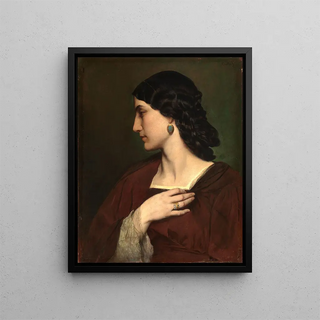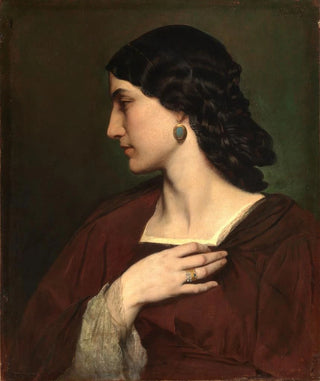Art print | Portrait of Nanna Risi - Anselm Feuerbach


View from behind

Frame (optional)
Portrait of Nanna Risi - Anselm Feuerbach – Captivating Introduction
In the art world, some works transcend their era to become timeless witnesses of human emotion and beauty. The "Portrait of Nanna Risi" by Anselm Feuerbach fits perfectly into this category. Created in the 19th century, this painting does more than depict a female figure; it evokes deep introspection and rare delicacy. Through Nanna's eyes, viewers are invited to explore a palette of emotions, ranging from melancholy to serenity. This artwork, with its refined aesthetic and captivating aura, continues to inspire and amaze those who immerse themselves in it.
Style and uniqueness of the work
Feuerbach's style is distinguished by its romantic approach and attention to detail. In this portrait, he manages to capture not only Nanna Risi's physicality but also her spiritual essence. The colors are carefully chosen, oscillating between soft tones and more vivid shades that create a striking contrast. The light, subtly modeled, caresses the young woman's face, accentuating her delicate features and highlighting her pensive expression. Each brushstroke seems charged with emotion, demonstrating exceptional talent that makes this work a true masterpiece. The composition, both classic and innovative, allows the viewer to feel an intimate connection with the subject, as if Nanna Risi were sharing a secret with those who take the time to admire her.
The artist and his influence
Anselm Feuerbach, an emblematic figure of the Romantic movement in Germany, knew how to mark his era with his innovative approach to painting. Influenced by the great masters of the Renaissance, he reinterpreted their techniques while infusing them with modern sensitivity. His work, often centered on mythological and historical themes, explores the beauty and complexity of human emotions. The "Portrait of Nanna Risi" perfectly illustrates this duality: both rooted in a solid artistic tradition and resolutely looking to the future. Feuerbach also had a significant impact on the next generation of artists, who saw in him a model of art.

Matte finish

View from behind

Frame (optional)
Portrait of Nanna Risi - Anselm Feuerbach – Captivating Introduction
In the art world, some works transcend their era to become timeless witnesses of human emotion and beauty. The "Portrait of Nanna Risi" by Anselm Feuerbach fits perfectly into this category. Created in the 19th century, this painting does more than depict a female figure; it evokes deep introspection and rare delicacy. Through Nanna's eyes, viewers are invited to explore a palette of emotions, ranging from melancholy to serenity. This artwork, with its refined aesthetic and captivating aura, continues to inspire and amaze those who immerse themselves in it.
Style and uniqueness of the work
Feuerbach's style is distinguished by its romantic approach and attention to detail. In this portrait, he manages to capture not only Nanna Risi's physicality but also her spiritual essence. The colors are carefully chosen, oscillating between soft tones and more vivid shades that create a striking contrast. The light, subtly modeled, caresses the young woman's face, accentuating her delicate features and highlighting her pensive expression. Each brushstroke seems charged with emotion, demonstrating exceptional talent that makes this work a true masterpiece. The composition, both classic and innovative, allows the viewer to feel an intimate connection with the subject, as if Nanna Risi were sharing a secret with those who take the time to admire her.
The artist and his influence
Anselm Feuerbach, an emblematic figure of the Romantic movement in Germany, knew how to mark his era with his innovative approach to painting. Influenced by the great masters of the Renaissance, he reinterpreted their techniques while infusing them with modern sensitivity. His work, often centered on mythological and historical themes, explores the beauty and complexity of human emotions. The "Portrait of Nanna Risi" perfectly illustrates this duality: both rooted in a solid artistic tradition and resolutely looking to the future. Feuerbach also had a significant impact on the next generation of artists, who saw in him a model of art.






